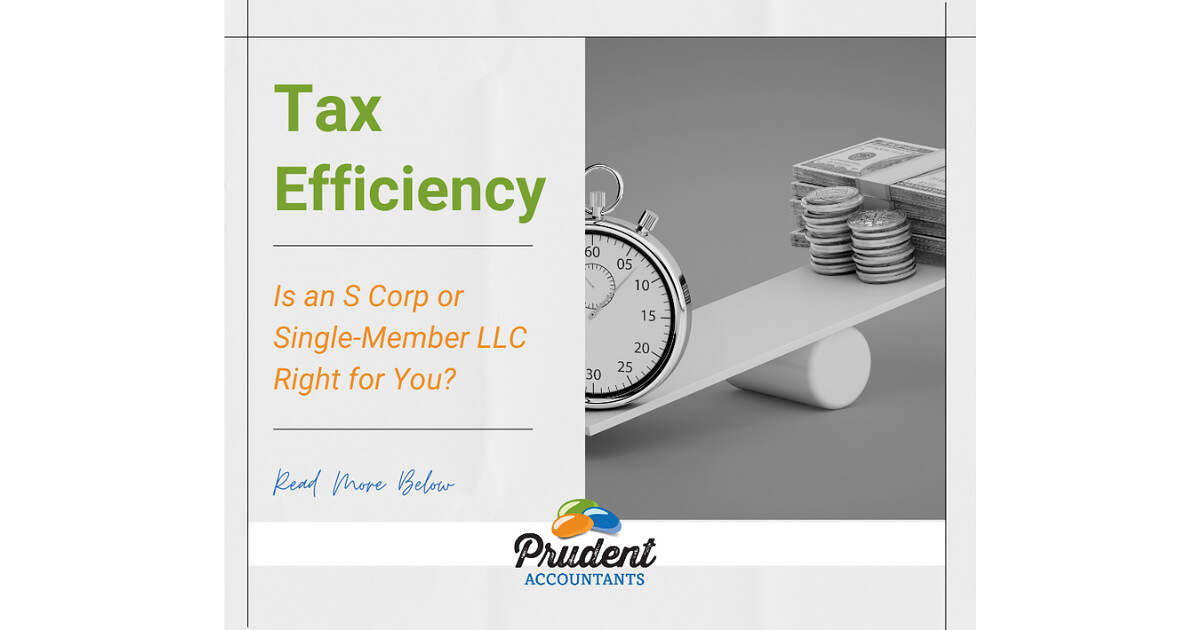S Corporation vs. Single-Member LLC: Which Tax Structure is Best for Your Business?

As a small business owner or entrepreneur, choosing the right tax structure is crucial for optimizing your financial benefits and minimizing liabilities. Two popular options are the Single-Member LLC (Limited Liability Company) and the S Corporation. Each has its own set of advantages and requirements, and understanding these can help you make an informed decision that aligns with your business goals.
Understanding Business Structures
What is a Single-Member LLC?
A Single-Member LLC (SMLLC) is a business entity with one owner, known as a member. It offers limited liability protection, meaning the owner’s personal assets are generally protected from business debts and claims. By default, the IRS treats a Single-Member LLC as a disregarded entity, which means the business’s income and expenses are reported on the owner’s personal tax return (Form 1040) using Schedule C. This simplicity makes SMLLCs attractive to small business owners who prefer straightforward tax filing and fewer administrative burdens.
What is an S Corporation?
An S Corporation (S Corp) is not a type of business entity but a tax designation available to eligible corporations and LLCs. By electing S Corp status through filing IRS Form 2553, a business can benefit from pass-through taxation while potentially reducing self-employment taxes. Unlike traditional C Corporations, S Corps avoid double taxation, where income is taxed at both the corporate and individual levels. Instead, profits and losses pass through to shareholders and are reported on their personal tax returns.
Tax Benefits of S Corporations
Reduction in Self-Employment Taxes
One of the main tax advantages of an S Corporation is the potential reduction in self-employment taxes. In a Single-Member LLC, the owner pays self-employment taxes (Social Security and Medicare) on the entire net income of the business. Conversely, an S Corp allows the owner to receive a reasonable salary, which is subject to employment taxes, and the remaining profits can be distributed as dividends, which are not subject to self-employment taxes. For example, if an S Corp generates $200,000 in profit and the owner takes a $50,000 salary, self-employment taxes are only paid on the $50,000 salary.
Avoidance of Double Taxation
S Corporations avoid the double taxation seen in C Corporations, where income is taxed at both the corporate level and again at the shareholder level when dividends are distributed. With S Corp status, the business’s income, deductions, and credits pass through to shareholders, who report this information on their personal tax returns. This can result in significant tax savings, especially for businesses with higher profits.
Pass-Through Taxation
Like LLCs, S Corporations benefit from pass-through taxation. This means that the business itself does not pay federal income taxes. Instead, income and losses are reported on the shareholders’ personal tax returns, allowing profits to be taxed at individual income tax rates, which can be advantageous depending on the owners’ tax brackets.
Benefits of Single-Member LLCs
Simplified Tax Filing
A key benefit of Single-Member LLCs is the simplicity of tax filing. Since the IRS treats SMLLCs as disregarded entities, the owner reports business income and expenses on their personal tax return using Schedule C. This eliminates the need for a separate business tax return, reducing the administrative burden and making tax preparation more straightforward.
Flexible Management Structure
Single-Member LLCs offer flexibility in management and fewer formalities compared to S Corporations. There are no requirements for annual meetings, bylaws, or issuing stock. This can be particularly advantageous for solo entrepreneurs who prefer to avoid the complexities of corporate governance.
State-Specific Advantages
In many states, forming an LLC can be quicker and less expensive than forming a corporation. LLCs also tend to have fewer ongoing compliance requirements, such as annual reports and fees, making them a cost-effective option for small business owners.
Eligibility Requirements for S Corporations
Basic Criteria
To elect S Corporation status, a business must meet several eligibility requirements. These include:
- Being a domestic corporation or LLC
- Having only allowable shareholders, such as individuals, certain trusts, and estates
- Not exceeding 100 shareholders
- Having only one class of stock
- Not being an ineligible corporation, such as certain financial institutions, insurance companies, and domestic international sales corporations (DISCs).
Filing IRS Form 2553
Businesses must file IRS Form 2553 to elect S Corporation status. This form must be submitted no later than two months and 15 days after the beginning of the tax year in which the election is to take effect, or at any time during the preceding tax year. Failure to file on time can result in the election being invalid for that year, so timely filing is crucial.
Practical Considerations
When to Choose an S Corporation
Electing S Corporation status can be particularly beneficial for businesses that expect significant profits or plan to distribute dividends. By minimizing self-employment taxes and avoiding double taxation, S Corps can offer substantial tax savings. This structure is also advantageous for businesses that want to raise capital by issuing stock, as it allows for easier transfer of ownership compared to LLCs.
When to Stick with a Single-Member LLC
A Single-Member LLC might be preferable for businesses that value simplicity and flexibility over potential tax savings. If your business has modest profits, the administrative requirements and costs associated with S Corporations may outweigh the tax benefits. Additionally, LLCs offer greater flexibility in management and fewer compliance requirements, making them ideal for solo entrepreneurs or small businesses that do not plan to issue stock or seek significant investment.
Prudent Accountants’ Services
At Prudent Accountants, we specialize in helping businesses determine the best tax structure to optimize their financial strategy. Our services include:
- Tax Planning: Developing customized tax strategies to maximize deductions and credits while ensuring compliance with tax laws.
- IRS Audit Support: Providing comprehensive support and representation during IRS and state tax audits.
- Business Advisory: Offering expert advice on financial planning, budgeting, and other strategic decisions to help your business thrive.
Our team of experienced professionals is dedicated to helping you navigate the complexities of tax planning and compliance, ensuring that you make informed decisions that benefit your business in the long term.
Contact Prudent Accountants today to schedule a consultation and learn how we can help you choose the right tax structure for your business. Whether you’re considering an S Corporation, a Single-Member LLC, or another business entity, our experts are here to provide the guidance and support you need to succeed.
Next Steps
Choosing between an S Corporation and a Single-Member LLC involves weighing various factors, including tax benefits, management flexibility, and compliance requirements. S Corporations offer potential tax savings through reduced self-employment taxes and avoidance of double taxation, making them ideal for profitable businesses and those seeking investment. On the other hand, Single-Member LLCs provide simplicity and flexibility, with fewer administrative burdens and costs.
By understanding the unique advantages and requirements of each structure, you can make an informed decision that aligns with your business goals. Check below for a presentation that we’ve included that goes over key details about S corporations, and for personalized advice and expert assistance, reach out to Prudent Accountants. Let us help you navigate the complexities of tax planning and optimize your financial strategy for success.
Want more details? Click here to download our full guide.








